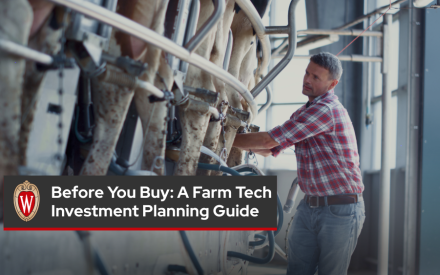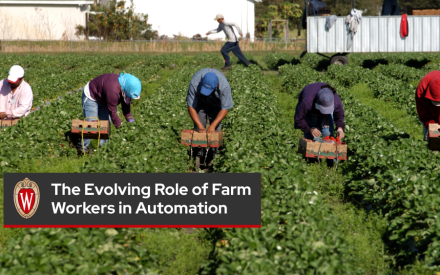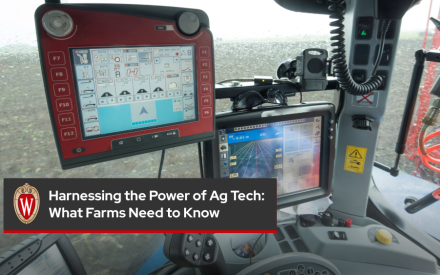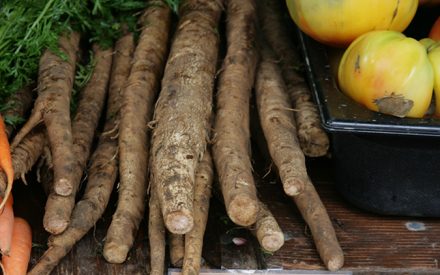“Beginning farmer” is a broad term that often refers to an individual who has been operating a farm for less than 10 years or someone who has not yet begun to operate a farm but is actively working toward doing so. Today’s beginning farmers tend to be more diverse than previous generations – in demographics, education and experience.
- Nationwide, beginning farmers are more likely to be women, have a college degree, and come from a diversity of backgrounds, when compared to experienced farmers (Ahearn, 2011)
- Beginning farmers in Wisconsin come from a variety of backgrounds, are often entering farming as a second career, and many of them have prior connections to farming that inspired them (Paine & Sullivan, 2015).
- Young farmers (which includes aspiring, beginning, and experienced farmers under the age of 35) are more likely to have not grown up on a farm, have advanced degrees, be women and/or farmers of color, and engage in diversified and sustainable practices (National Young Farmers Coalition | Building a Future with Farmers II, 2017)
In response, the way in which individuals enter farming has become more diverse as well. Programs and trainings that served previous generations of farmers are being expanded and re-defined to meet the needs of new farmers today. Previous programs tended to serve a narrow group of farmers – primarily young, mostly white men who grew up on farms and were looking for additional education. Traditional academic institutions also have a history of not meeting the needs of diverse farmers and farming systems, especially around sustainable practices (Hassanein, 1999).
However, since 2000 education and training opportunities have emerged that serve a wider range of new farmers (Niewolny & Lillard, 2010) and look different from traditional farmer training in several ways:
- Focus more on new farm businesses, instead of educating farmers who are taking over an established farm
- Often center on sustainable agricultural practices
- Serve a more diverse range of “beginning farmers”- including groups with various levels of experience (aspiring through experienced) and from more diverse backgrounds
- Go beyond production skills by incorporating topics like business development, land access, and financial management
- Provide social-networking opportunities
- Focus on hands-on learning with a more place-based knowledge focus
- Vary in organizational structure from academic institutions to nonprofits and farmer networks
Academic institutions and Extension continue to offer and expand educational programs for beginning farmers. For example, the University of Wisconsin-Madison’s Farm and Industry Short Course (FISC) continues to offer foundational classes for traditional beginning farmers through its first-year Foundations of Farm & Agribusiness Management Certificate and second-year certificate tracks, but now also offers classes that focus on livestock grazing, organic grain production, and urban agriculture. Wisconsin technical colleges offer associate degrees, technical diplomas, and certificates for individuals interested in a wide variety of careers in agriculture. In addition, non-profit organizations have been playing an even bigger role in recent years when it comes to beginning farmer education.
Diversity in programming can be seen across Wisconsin and neighboring states. Programs are designed to provide education and training for new farmers in a wide variety of ways, but they can be generally sorted into three categories: Education Programs; Hands-On Training; and Mentorship.
Education Programs
Education programs across the region include both online and in-person classes and range in length from short-term workshops like the Wisconsin School for Beginning Market Growers to longer-term offerings like the yearlong Farm Beginnings Program. They also span a range of topics – including farm finance, business planning, and production skills – as well as a diversity of farm enterprises including vegetables, livestock, dairy, fruit crops.
Hands-on Training
Beginning farmers today are less likely to have grown up on a farm, which means there is an increased need for hands-on training opportunities. Organizations in and around Wisconsin have responded to this, creating everything from the first registered agricultural apprenticeships in the country (Dairy Grazing Apprenticeship and the Organic Vegetable Farm Manager Apprenticeship); to a range of other on-farm training programs that provide opportunities for individuals new to farming, or a specific type of farming, to get hands-on experience in the field.
Mentorship
Mentorship programs bring beginning farmers together with experienced persons in the field for knowledge sharing and education. Opportunities range in length from weekend-long offerings like the Beginning Farmer Retreat hosted by Practical Farmers of Iowa to longer-term one-on-one relationships like the mentorship program hosted by Marbleseed (formerly Midwest Organic and Sustainable Education Service MOSES).
Many of these programs serve beginning farmers with a range of prior knowledge and experience, but certain programs may be best suited for farmers at a certain level. The Beginning Farmer Training and Education Programs gives an overview of available programs organized by beginning farmer level and category.
Additional Opportunities
In addition to taking part in the education and training programs that are specifically for beginning farmers, new farmers may find valuable learning opportunities through program offerings geared toward all levels of farmers such as field days, conferences or listervs.
The Organizations Serving Beginning Farmers in Wisconsin map identifies organizations in the region that host programs that provide education, training, and other resources specifically geared toward beginning farmers. While not all organizations are based in the state, they all offer programs and resources that are available to farmers in Wisconsin.

 Before You Buy: A Farm Tech Investment Planning Guide
Before You Buy: A Farm Tech Investment Planning Guide Balancing Technology and People: The Evolving Role of Farm Workers in Automation
Balancing Technology and People: The Evolving Role of Farm Workers in Automation  Harnessing the Power of Ag Tech: What Farms Need to Know
Harnessing the Power of Ag Tech: What Farms Need to Know Organic Transition: Purpose, Process, and Resources
Organic Transition: Purpose, Process, and Resources


